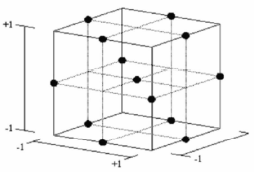Box Behnken
Generates higher order response surfaces using fewer required runs than a normal factorial.

Figure 1.
Box Behnken designs and CCF Central Composite Design can be visualized as near compliments of each other. They both essentially suppress selected runs from a Full Factorial matrix in an attempt to maintain the higher order surface definition. For example, for three three-level variables, the Full Factorial run size is 27. The Central Composite Design drops all of the middle edge nodes, resulting in only 15 runs. The Box Behnken design is nearly the opposite in that it uses the twelve middle edge nodes and the center node to fit a 2nd order equation. A Central Composite Design plus a Box Behnken design becomes a Full Factorial with extra samples taken at the center.
Usability Characteristics
- Generally used for fitting a second-order response surface.
- Only defined when all of the variables have three levels.
- Should not be used when accurate predictions at the extremes are important.
- Any data in the inclusion matrix is combined with the run data for post-processing. Any run matrix point which is already part of the inclusion data will not be rerun.
Settings
| Parameter | Default | Range | Description |
|---|---|---|---|
| Design | Auto Select |
Note: bbdgn stands for Box Behnken
design.
|
Select the lowest number of runs sufficient to study effects. |
| Number of Runs | Dependant upon the design selected. | 13-57 | Number of new designs to be evaluated. |
| Use Inclusion Matrix | Off | Off or On | Concatenation without duplication between the inclusion and the generated run matrix. |